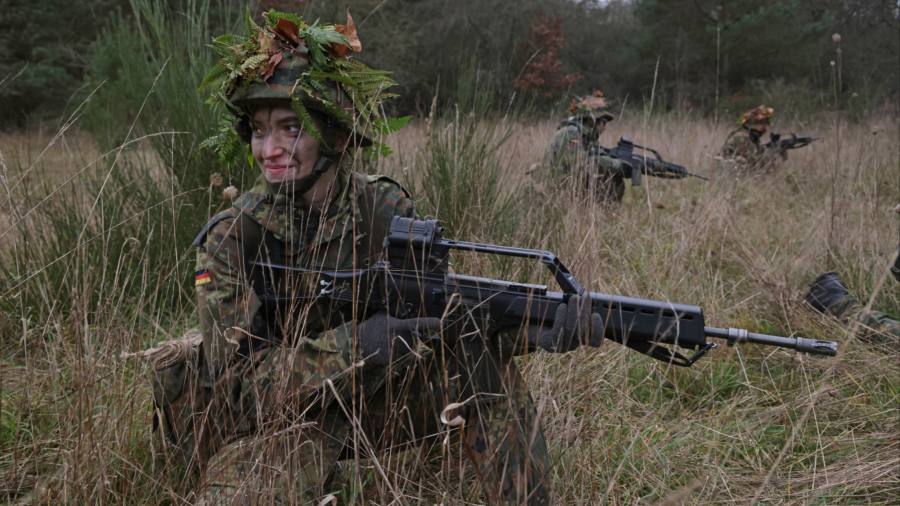The writer directs the Center on the US and Europe at the Brookings Institution
“Look at us! We’re a serious, grown-up country now!” This was the self-congratulatory message Germany’s chancellor Olaf Scholz had to convey to the world on Wednesday, when he stepped in front of the assembled national press, accompanied by his foreign, defence, finance and interior ministers. What they were about to announce was historic: Germany has just given itself a national security strategy for the very first time.
Across western capitals, sounds of languid clapping could be heard. Most people who have ever had to write such strategy papers express a strong preference for some form of corporal punishment over the prospect of ever having to do it again.
Nonetheless, practitioners concede that the exercise has real uses. It forces a government to focus its resources, to explain its priorities, and to state how it intends to achieve them: to itself, to its voters, to its allies and to its adversaries. If done well (and it sometimes is), it can articulate a coherent, even compelling narrative to rally citizens around a sense of national purpose. This can be especially important in a great crisis.
In the US, new administrations have been required by Congress to produce a national strategy document at the outset of their tenures since 1986. The UK, France, Canada and Japan all have published similar documents or even several; so has Nato.
Even the herbivorous EU gave itself a strategy in 2003 (updated in 2016), galvanised by the horror of the 9/11 attacks on America by the Taliban and the spectacle of the Bush administration marching into Iraq on the filmiest of pretexts.
Germany, the powerhouse of continental Europe, was the only country (except Italy) in the G7 club of the world’s greatest industrial democracies without a national security strategy. Why?
Scholz’s chief of staff Wolfgang Schmidt caused a brief uproar in Berlin last October when he suggested that Germany’s public debates on national security were still in their “teenage years”. His annoyance was directed at the experts calling on the reluctant chancellor to supply Ukraine with the Leopard tanks it was begging for. But he did (albeit inadvertently) pinpoint a larger issue. Germany’s juvenile phase has lasted rather longer than most: 34 years since the reunification of East and West Germany and with it the restoration of full sovereignty in 1990.
In truth, the “five stages of grief” identified by the psychoanalyst Elisabeth Kübler-Ross — denial, anger, bargaining, depression and acceptance — are equally applicable to Germany’s long farewell to its adolescence.
Denial: Germans saw the fall of the Berlin Wall and the subsequent restoration of “a Europe whole and free” as a validation of decades of reconciliation efforts; no country on the continent believed as fervently in the theory of the “end of history”.
Anger came in June 1999, when German troops in Kosovo returned fire with lethal effect for the first time since 1945. Bargaining: despite multiplying troop deployments, Germany’s much-preferred instrument of foreign policy remained the cheque book for a quarter of a century.
Depression set in with the realisation that the bargaining really wasn’t working anymore — not with Putin’s Russia, Xi Jinping’s China, the mullahs’ Iran nor with Donald Trump’s America. And acceptance came when the so-called “traffic light” coalition set itself the task of writing a national security strategy in its 2021 coalition agreement, recognising that after the incrementalism of the Angela Merkel years, it was time for some transformative change.
Of course what they meant was social justice (the Social Democrats), saving the planet (the Greens) and returning to zero debt (the Free Democrats). What they got was a brutal full-scale invasion of Ukraine by Russia that threatens the entire European security order.
So will Germans now once again be — in the immortal words of Tom Lehrer — “warlike and mean”? Well, the good news in the new strategy document is that it unequivocally endorses nuclear deterrence (historically a sticking point for Social Democrats and Greens); calls for EU enlargement; and rightly highlights Germany’s domestic security and the need to make it more robust and resilient.
But there is also some distinctly less good news. The issue of whether Germany will reach its Nato defence spending goal of 2 per cent of gross domestic product is fudged (with a defence budget of €50bn, it remains well short of the €75bn it would need). And to call Russian imperialism a threat and China a systemic rival is no more than describing the status quo. What if Russia expands its war? What if China actively takes its side? What if the next US president turns away from Europe?
In other words, the current deterioration of Europe’s security climate could yet turn into a strategic Ice Age. A national security council (or similar advisory body) might have been tasked with thinking about the unthinkable — but the chancellery vetoed institutional innovations. So that job stays with a governing coalition that in recent weeks has often seemed to teeter on the brink of a nervous breakdown. Growing up is hard to do.
Read the full article here




